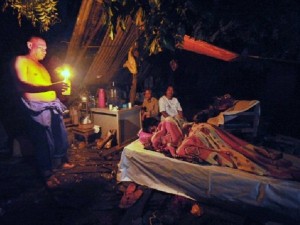
MORE DARK DAYS AHEAD. In this file photo, residents of a village in Cagayan De Oro City in Mindanao affected by the devastating flash flood used an improvised torch as they prepare to sleep at their temporary shelter. AFP/TED ALJIBE
Mindanao’s power woes are expected to be further aggravated as landowners in certain parts of the island have threatened to prevent National Grid Corporation of the Philippines and state-owned National Transmission Corp. (Transco) from entering their property where transmission towers have been put up.
In a statement, lawyer Paterno Esmaquel, who was commissioned by nongovernment organization Pilipinas Para sa Pinoy Inc. (PPP), said the 87 affected landowners would make good on their threats unless they receive their right-of-way settlement from Transco.
The warnings, according to Esmaquel, could further exacerbate the Mindanao power situation as NGCP and Transco would be barred from conducting much-needed regular maintenance of the affected towers.
The warning stemmed from claims of 87 landowners that Transco have yet to compensate for the use of their lands for its transmission towers. The 87 claimants already included the eight landowners who recently surfaced and sought just compensation from Transco for the use of their lands for the latter’s transmission facilities after more than 20 years.
The land owners said they could file separate criminal complaints against Transco president Rolando Bacani and hold him criminally liable for violating the Anti-Graft and Corrupt Practices Act for Transco’s failure to pay the claims of the affected land owners.
The Mindanao-based landowners claimed their lands were being occupied by Transco’s transmission towers. They alleged that Transco had built the transmission tower on their property more than 20 years ago without paying just compensation or rentals.
The amount was not specified in the letter since it still had to be determined.
The landowners said the transmission towers had caused unrealized revenues to them and that Transco’s occupation or use of the lands was illegal and unlawful without an expropriation order from the courts or a negotiated agreement on the right of way.